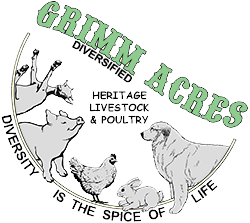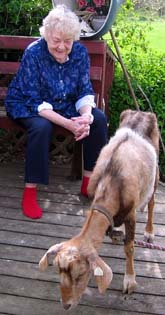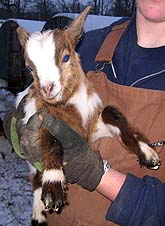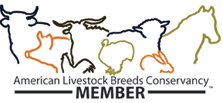Our breeding stocks
Here at Grimm Acres our search for the right livestock mix for our small enterprise led us to the Livestock Conservancy. This wonderful organization has been working to protect and restore heritage breeds of livestock and poultry in America since 1977. The information on their website encouraged us to educate ourselves about the history of farm animals in the U.S., and the incredible value of the genetic diversity these older breeds contribute to us today. Please visit them at www.livestockconservancy.org
We found the perfect match for our little enterprise in the often small size, versatility and charm of many of these livestock breeds. Knowing that the breeds actually need us to help them avoid becoming extinct has given us a senses of pride and accomplishment far beyond what we expected when we first 'brainstormed' this little farm.
As the extraordinary American naturalist (Charles) William Beebe said,
"...when the last individual of a race of living things breathes no more, another Heaven and another Earth must pass before such a one can be again."
Breeds we currently raise
Poultry breeds
Chicken Breeds
Our ambition is to be a resource for others interested in raising some or all of these breeds by providing breeding stock and information based on our own experiences.
Today we offer goats and kids, pigs, hatching eggs, chicks and some adult birds as they become available.
We welcome visitors to the farm here at Grimm Acres, and any questions and comments you may have.
Individual Breeds:
Tennessee Fainting Goats
Our Fainting Goats have proven to be the perfect little meat goat for Grimm Acres. Their charming personality and habit of "fainting" when startled, excited, or for no observable reason makes them a favorite of many people as pets, and as novelties. We love that these goats are easy to keep, are great mothers, and are an ideal size for butchering when we do not want to pack the freezer full. Our customers often split one goat making the purchase both affordable and convenient for handling and storing.
Fainting Goats have a breed characteristic known as myotonia congenital which causes the muscles to contract when they are startled. The goat is not actually fainting, but appears to "lock up" sometimes even falling over in its stiffened state. According to the American Livestock Breeds Conservancy, the goats first showed up in the United States when a transient farm worker from Nova Scotia brought four of them to Tennessee in the 1800's. Apparently the local farmers liked the goats, finding them easy to keep inside a fence, productive and muscular. The farm worker moved on leaving his "stiff", "nervous" or "fainting" goats behind.
Tennessee Fainting Goats come in a variety of colors. The goats we raise are the smaller variety, usually weighing less than 90 pounds at two years. The does commonly have twins or even triplets. They are attentive mothers and have plenty of milk for their multiple offspring.
American Guinea Hogs
Possibly my favorite animal on the farm, our Guinea Hogs are a small black breed that is not found anywhere else in the world. Not long ago there were fewer than 200 Guinea Hogs registered in the United States and the ALBC lists them as "Critical".
Guinea Hogs commonly weigh between 100 and 300 pounds. Ours are 150 to 200 when grown. They have a calm, inquisitive personality and will roll on their sides to have a nice "belly scratch". These hogs do not root as aggressively as the commercial pigs that I am familiar with, but love to dig about in soft soil searching out grubs and chunks of roots.
Like our other livestock, the Guinea Hogs do very well on pasture, with a little supplemental feeding.
The sows are good mothers raising 6 to 10 'piggies' in little shelters we put out on the pasture for them. The boar hog we have currently, whose name is Miles, is attentive to the babies allowing them to climb across him and snuggle with him to sleep.
The pork is exceptional. More than one customer has told us, "That is how Grandmas pork chops tasted!"
Silver Appleyard Ducks
Listed by The Livestock Conservancy as "Threatened" "Applyards are being raised for exhibition, pets, decoration, eggs, and gourmet roasting ducks." (Holderread, 2001) They are one of the best layers among the heavyweight ducks, averaging 220 to 265 white shelled eggs per year. They are active foragers with calm temperaments and will tend to stay close to home if well fed.
Since Ducks don't scratch like chickens do, we love them around the garden where one of their favorite meals is snails and slugs.
The ducks are broody if given a chance and ours have hatched a nest of ducklings in her outside nest several times.
When butchered, these ducks, weighing 8 to 9 pounds, produce lean and richly flavorful meat.
Runner Ducks
One of the favorite attractions here at Grimm Acres, Diversified is our small flock of Runner Ducks. Their legs are set farther back on their bodies than other ducks, and the walk, or more often, run with an upright stance that makes them look a bit like "wine bottles with heads" scooting across the field.
The Runner Duck's history reaches back 2000 years in Indo China where herds were driven to fields and rice paddies to glean weed seeds, snails, and various insects assisting the farmer to grow a better crop. The ducks would be driven home at night to the protection of a small shelter or pen where their eggs could be gathered for the family.
At Grimm Acres, we love the aggressive way these ducks devour insects, especially the snails that can be a link in the life cycle of several livestock parasites.
Though small ducks, weighing in at around 4 pounds, they will lay better than 200 white eggs a year. Runner Ducks are excellent foragers, easy to keep, and an exceptionally entertaining addition to the farm.
Blue Cochin Chickens and Bantam Cochins
Another good winter layers, the Cochins are, hands down, our favorite chickens. They look to us like the perfect barnyard chicken with their full, fluffy feathers. When they run we picture an "old lady" hiking up her skirt and running with petty coats flapping.
They lay a large brown egg which they are very happy to set on if left to their own devices. In fact, they will gladly set on any eggs placed under them and can be used to hatch turkey eggs and even duck eggs, although I have been told some very funny stories of the hens running back and forth along the bank of a pond the first time the ducklings decide to go for a swim.
Cochins tolerate cold weather extremely well. They stay close to home and enjoy human company. We keep Cochins as 'front yard' hens because they do not scratch as aggressively as other breeds and are friendly, gentle and curious when visitors come to call. And, because they are so pretty.
The Livestock Conservancy lists Cochins as Watch.



